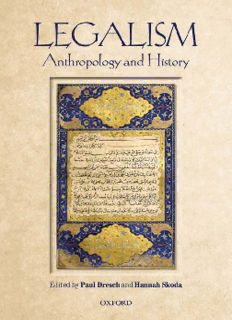
Legalism : anthropology and history PDF
Preview Legalism : anthropology and history
LEGALISM This page intentionally left blank Legalism Anthropology and History Edited by PAUL DRESCH AND HANNAH SKODA 1 3 Great Clarendon Street, Oxford, OX(cid:874) (cid:878)DP United Kingdom Oxford University Press is a department of the University of Oxford. It furthers the University’s objective of excellence in research, scholarship, and education by publishing worldwide. Oxford is a registered trade mark of Oxford University Press in the UK and in certain other countries © The several contributors, (cid:874)(cid:872)(cid:873)(cid:874) The moral rights of the authors have been asserted First Edition published (cid:874)(cid:872)(cid:873)(cid:874) Impression: (cid:873) All rights reserved. No part of this publication may be reproduced, stored in a retrieval system, or transmitted, in any form or by any means, without the prior permission in writing of Oxford University Press, or as expressly permitted by law, by licence or under terms agreed with the appropriate reprographics rights organization. Enquiries concerning reproduction outside the scope of the above should be sent to the Rights Department, Oxford University Press, at the address above You must not circulate this work in any other form and you must impose this same condition on any acquirer Crown copyright material is reproduced under Class Licence Number C(cid:872)(cid:873)P(cid:872)(cid:872)(cid:872)(cid:872)(cid:873)(cid:876)(cid:880) with the permission of OPSI and the Queen’s Printer for Scotland British Library Cataloguing in Publication Data Data available Library of Congress Cataloging in Publication Data Library of Congress Control Number: (cid:874)(cid:872)(cid:873)(cid:874)(cid:881)(cid:876)(cid:874)(cid:881)(cid:881)(cid:880) ISBN (cid:881)(cid:879)(cid:880)–(cid:872)–(cid:873)(cid:881)–(cid:881)(cid:878)(cid:878)(cid:876)(cid:874)(cid:878)–(cid:881) Printed in Great Britain by CPI Group (UK) Ltd, Croydon, CR(cid:872) (cid:876)YY Links to third party websites are provided by Oxford in good faith and for information only. Oxford disclaims any responsibility for the materials contained in any third party website referenced in this work. Preface and Acknowledgements Very great thanks are owed to St John’s College, Oxford, whose Research Centre paid for the beginnings of this project and supported the series of weekly seminars in Oxford that grew from this in the course of two years. Fernanda Pirie of St Cross College then secured funds from the Foundation for Law, Justice, and Society to allow a two-day workshop at St John’s in June (cid:874)(cid:872)(cid:873)(cid:873), where drafts of the present chapters of this volume were discussed. The support of the Foundation was invaluable and is gratefully acknowledged. Mary Montgomery is thanked for her excellent help with the long editorial task of preparing a (cid:976)inal draft. The project began with cooperation among anthropologists and medievalists (Paul Dresch, Patrick Lantschner, Fernanda Pirie, Judith Scheele, Hannah Skoda, Malcolm Vale), assisted at that point by a lone classicist (Georgy Kantor). All of us are very grateful indeed to the historians, classicists, orientalists, and students of law who joined us later and who made the weekly legalism seminar such fun. We have elected to keep the focus of the volume, though not that of all the chapters, roughly where it was. The medieval European world (a ‘game of two halves’ in any but recent literature) raises questions that highlight the concerns of our authors generally. As Paul Hyams once remarked, ‘its unique cultural position, en route to the modern West but still very diff erent from it, off ers insights into the diff erences between Western values and those of present-day non-Western cultures that too often serve as the various “Others” of our world.’ The editors would particularly like to thank Judith Scheele of All Souls, not only for the eff ort she gave to organizing the later seminars (without her, the series might well have collapsed), but for her generosity in providing so many ideas so freely and sharing the fruits of her wide reading. The intention is that two further volumes will follow: one on community and justice, and the other on categories and rules. P.D. H.S. March (cid:874)(cid:872)(cid:873)(cid:874) This page intentionally left blank Contents List of Figures ix List of Contributors xi Introduction Legalism, Anthropology, and History: a View from Part of Anthropology 1 Paul Dresch A Historian’s Perspective on the Present Volume 39 Hannah Skoda 1. Ideas of Law in Hellenistic and Roman Legal Practice 55 Georgy Kantor 2. C entres of Law: Duties, Rights, and Jurisdictional Pluralism in Medieval India 85 Donald R. Davis Jr. 3. The Evolution of Sanctuary in Medieval England 115 T.B. Lambert 4. A spects of Non-State Law: Early Yemen and Perpetual Peace 145 Paul Dresch 5. T he English Medieval Common Law (to c. 1307) as a System of National Institutions and Legal Rules: Creation and Functioning 173 Paul Brand 6. R ightful Measures: Irrigation, Land, and the Sharīʿah in the Algerian Touat 197 Judith Scheele 7. Lord Kyaw Thu’s Precedent: a Sixteenth-Century Burmese Law Report 229 Andrew Huxley viii Contents 8. C ustom, Combat, and the Comparative Study of Laws: Montesquieu Revisited 261 Malcolm Vale 9. Legal Performances in Late Medieval France 279 Hannah Skoda References Cited (cid:875)(cid:872)(cid:879) Index (cid:875)(cid:876)(cid:881) List of Figures 6.1 The Greater Touat (Algeria) 203 7.1 Part of the Toungoo Empire 233 7.2 Kyaw Thu’s ten (cid:976)indings 248 7.3 Bacon’s speech for the Post-nati 257
Description: